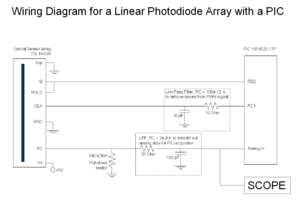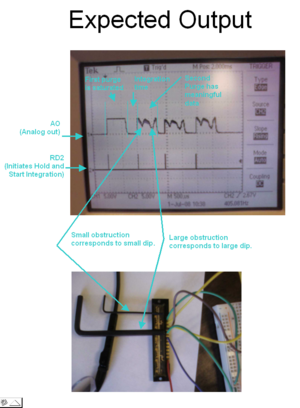Difference between revisions of "Interfacing with a Photodiode Array"
| Line 2: | Line 2: | ||
[[Image:Expected Output.png|thumb|right|300px|Wiring Diagram]] |
[[Image:Expected Output.png|thumb|right|300px|Wiring Diagram]] |
||
The TAOS Photodiode Linear Sensor Array (TSL1406R) is an array of 768 photodiodes spread over the length of about 2 inches. Each of the individual photodiodes outputs an analog voltage which is proportional the intensity and duration of incident light. |
The TAOS Photodiode Linear Sensor Array (TSL1406R) is an array of 768 photodiodes spread over the length of about 2 inches. Each of the individual photodiodes outputs an analog voltage which is proportional the intensity and duration of incident light. |
||
During the integration time, an dedicated capacitor (included in the TSL1406R) is charged by each of the photodiodes. When the HOLD signal goes high, each of the charges accumulated during the integration time is simultaneously passed to its dedicated holding capacitor. The analog voltages on each holding capacitor can then be read one-by-one at the clock speed. Here I use the PWM function of the PIC to act as the CLK signal. |
This duration that the photodiode is allowed to create charge is called the "integration time". During the integration time, an dedicated capacitor (included in the TSL1406R) is charged by each of the photodiodes. When the HOLD signal goes high, each of the charges accumulated during the integration time is simultaneously passed to its dedicated holding capacitor. The analog voltages on each holding capacitor can then be read one-by-one at the clock speed. Here I use the PWM function of the PIC to act as the CLK signal. |
||
In this particular code, the data is clocked out so quickly that it is impossible to read every analog level (since the PIC is only capable of an analog read every ~5us). To remedy this, we low pass filter the analog output and read in analog data as quickly as possible. |
In this particular code, the data is clocked out so quickly that it is impossible to read every analog level (since the PIC is only capable of an analog read every ~5us). To remedy this, we low pass filter the analog output and read in analog data as quickly as possible. |
||
Revision as of 20:26, 10 June 2009
The TAOS Photodiode Linear Sensor Array (TSL1406R) is an array of 768 photodiodes spread over the length of about 2 inches. Each of the individual photodiodes outputs an analog voltage which is proportional the intensity and duration of incident light.
This duration that the photodiode is allowed to create charge is called the "integration time". During the integration time, an dedicated capacitor (included in the TSL1406R) is charged by each of the photodiodes. When the HOLD signal goes high, each of the charges accumulated during the integration time is simultaneously passed to its dedicated holding capacitor. The analog voltages on each holding capacitor can then be read one-by-one at the clock speed. Here I use the PWM function of the PIC to act as the CLK signal.
In this particular code, the data is clocked out so quickly that it is impossible to read every analog level (since the PIC is only capable of an analog read every ~5us). To remedy this, we low pass filter the analog output and read in analog data as quickly as possible.
Each TSL1406R has two 384-pixel arrays which can be interfaced in serial or in parallel. This code interfaces with a single 384-pixel array. Sample code: Photodiode_array.c Link to all sample code here.
For code that interfaces both 384-pixel arrays, and determines a finger's position, see Finger Position Sensing with a Photodiode Array

